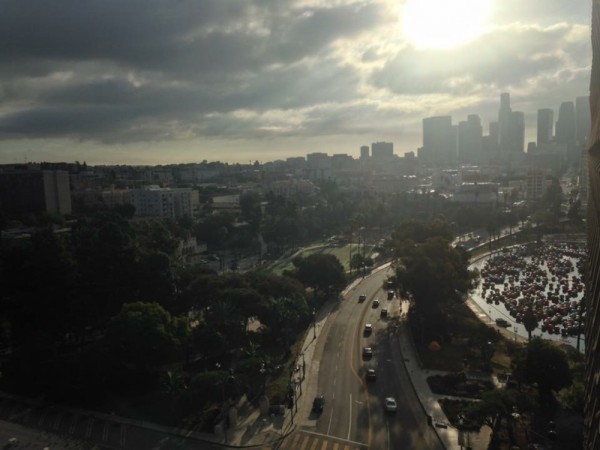I ran away from home at 14 years old. I didn’t grab a backpack and go sleep at a friend’s. I didn’t steal away in the middle of the night. Rather, I convinced my stunned parents to send me to Spain to live with a free-spirited aunt I barely knew.
The ensuing year, my sophomore year of high school, pretty much determined how I’d live my adult life—at least so far. Madrileños taught this cul-de-sac’d suburban boy how to take nightly strolls, to find refuge in cafes and bars, and otherwise live much of my life in public. Madrid turned me into what my mother calls a callejero—someone who’s always in the calle, or street.
But only recently have I realized how moving away at such a young age changed my very understanding of what home means.
If you ask me whether I love L.A., the city I was born in, raised around, and have lived in for more than 20 years, I’d say absolutely, yes. But my stated love for the place may not be based on any objective merits or anything this rapidly gentrifying city actually has to offer me.
In thinking about why people attach themselves to certain locations, I discovered that my own attachment to L.A. comes from two sources, both of them rather romantic.
First, I was baptized at La Placita Church, the same place my father was baptized in 1930. La Placita is across the street—and derives its name—from La Plaza, the center of the original pueblo of Los Angeles, which was founded in 1781. In other words, the very site of my baptism connects me to the origin story of my city on several levels—gathering together my familial, religious, ethnic, and civic identities. For me, La Placita is the epicenter of all that is genuinely L.A.
A city, in the final analysis, is the collection of stories its citizens tell about it. A truly great civic culture is the blending of millions of narratives into a powerful sense of belonging for as many of its residents as possible.
Popular culture, particularly in a city like L.A., plays a powerful role in this collective narrative. How many Angelenos have not heard classics like “I Love L.A.”, “Ventura Highway,” “It Was a Good Day,” or “Free Fallin’”? While in Spain, I gained a special love for Joni Mitchell’s “California,” and would sing it aloud whenever I got homesick.
The old adage tells us that home is where the heart is. But Tony Bennett convinced us long ago that you can leave your heart just about anywhere. Having moved away so young, I learned—through songs and movies—to mythologize home from a distance. And this is the second romanticized source of my Angeleno attachment: absentee nostalgia.
My personal understanding of home, then, wasn’t that of a city where I necessarily lived or even found comfort in, but rather a place where I often didn’t find myself and would occasionally long for. My love for Los Angeles, in other words, is driven largely by nostalgia, longing, and memory that goes well beyond my lived experience. Does this make my affection for the city any less real? I don’t think so.
But still, there’s nothing more replenishing of my attachment to home than the occasional—OK, frequent, if we’re honest—escape from it. I feel the need to leave Los Angeles every so often, as surely as I feel the exhilaration every time my plane touches back down at LAX upon my return.
The great geographer Yi-Fu Tuan has written elegantly about the eternal tension between place and space. “Place is security, space is freedom,” he writes. “We are attached to the one and long for the other.”
While my personal experience encourages me to love home from afar, I think L.A.’s often-maligned sense of placelessness—read freedom—simultaneously seduces me from a distance. Even the iconic view from my living room window—the palm trees, the Griffith Observatory, the Hollywood sign—sometimes makes me feel as if I were looking out at a distant Oz that remains perennially beyond my reach.
I’ve been traveling a great deal lately and the other day I realized that the only place I’ve felt jet -lagged was in Los Angeles, which seemed sort of perfect. I had that wonderfully fuzzy far-from-home feeling right here—at home.
Gregory Rodriguez is the founder and publisher of Zócalo Public Square.
*Photo courtesy of Gregory Rodriguez.










